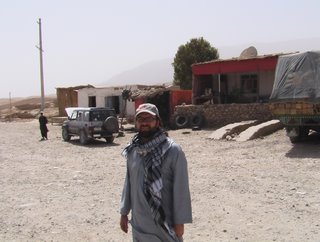After spending a few weeks in the front line of the war on terror - as my friend J likes to call his time in Afghanistan I now have more incite in to this modern phenomenon. (Though I would like to add here that this gets invoked regularly in Kabul - as in lets get smashed, go to a Chinese whorehouse, go to Dubai for a night - as we deserive as we are on the frontline of the war on terror...by I digress)
The main problem is that the war on terror doesn't mean anything. Th Oxford Dictionary gives the following definitions for terror:
1. intense, sharp, overmastering fear: to be frantic with terror.
2. an instance or cause of intense fear or anxiety; quality of causing terror: to be a terror to evildoers.
3. any period of frightful violence or bloodshed likened to the Reign of Terror in France.
4. violence or threats of violence used for intimidation or coercion; terrorism.
5. Informal. a person or thing that is especially annoying or unpleasant.
While I suspect that the US administration and the various Media pundits who ran with this term after September 11 2001 meant terror to be the 4th definition, it seems that it has slipped now to mean fear or anxiety or perhaps the 5th definition - any person or group whom we find especially annoying or unpleasant. It reminds me of Asterix and Obelix and their little Gaulish village - he was fond of saying that all we have to fear is fear itself (http://gb.asterix.com). Perhaps all we need be terrified of is terror itself. And what I mean by that is that our own anxieties and fears and terrors are what defeat us.
When the Twin Towers fell it was a shock to all civilized people. It was natural that the US president came out firing, promising that heads would roll and that the perpertrators of the heinous act should be brought to justice. I was in New York in November 2001, and a patriotic ferver had overtaken the place. American flags were everywhere and you couldn't watch any TV without seeing exploded diagrams inside Osama Bin Laden's Afghan hideout or a story on the evil scourge of the Taliban or links between various Middle Eastern regimes and Al-Qeada. There was also exteme anxiety - the Statue of Liberty was closed and had been for 2 months, a plane crash in Queens caused the city streets to be gridlocked and other tourist attractions such as the Empire State Building to be closed to the public. This ferver and anxiety drove policy in the early days of the War on Terror and still seems to today - but five years on there seems to be a glaring need to reassess the policy and actions taken post 2001. Because we are losing the war.
It's not really a war on terror - what this socalled war is, at it's core, is containment of extremism or fanaticism. The kind of fanaticism that we see writ large on our TV news bulletins has always existed. And it exists in all religons. In fact Christianity has has it's fair share of fanatical sects and even those who advocated and used violence to effect religious outcomes. What it comes down to is the fanatics quest for immortality.
The philosopher Ernest Becker was first to really identify the quest for immortality has a hard-wired human trait. In a great documentary I saw a few months back called "Flight from Death: The quest for immortality" some American scientists and sociologists have extended the work Becker started to prove this really is a trait that spans all human existence. So far they have completed many different experiments accross many countries and social groups and what comes out is the fact that we as humans, to cope with the fact that we can comprehend and even anticipate our own death, look for ways to immortalise our existence by being part of something larger than ourselves. For many that is religion, for others a patriotic state or others a philosphy or way of life that we think transcends our own existence. Where this becomes a problem is when we feel our version of immortality is threatened by others. Fanatic Muslems, for example, would rather die as suicide bombers to protect their version of immortality than live peacefully watching "Western Values" degrade their puratanical version of Islam. Or more poignantly watching foreign troops invade and occupy their country. While I can understand and even symphathise with this view it is not they way I would like to see people live.
However, if the compassionate Mulit-cultural and Multi-religous world is one that goes against the nature of humans then I think we need to try and change that. It is quite easy to sit back and take pot shots at people whose life view is different from our own. But ultimately this leads to a situation where violence proceeds any form of understanding and old-sterotypes are reinforced. But their are two fronts to fight to change our natures; the first is ignorance and the second is cynicism. Ignorance is potentially easy to combat through education. Cynicism is more pervasive - if this is human nature how are we to change it?
But I believe that the time for fanatics and extreme views will pass and more compassionate and understanding people will come to take their place. Perhaps this is naive optimism - but if this does not happen what will be the outcome? I cannot believe that we are really destined to kill each other.





